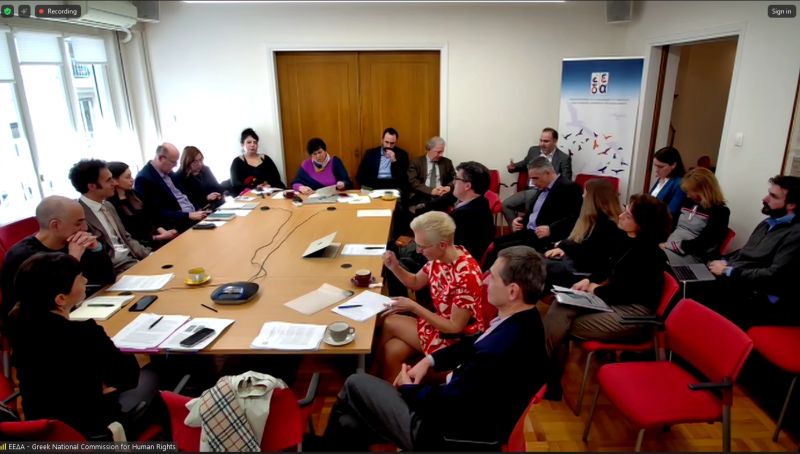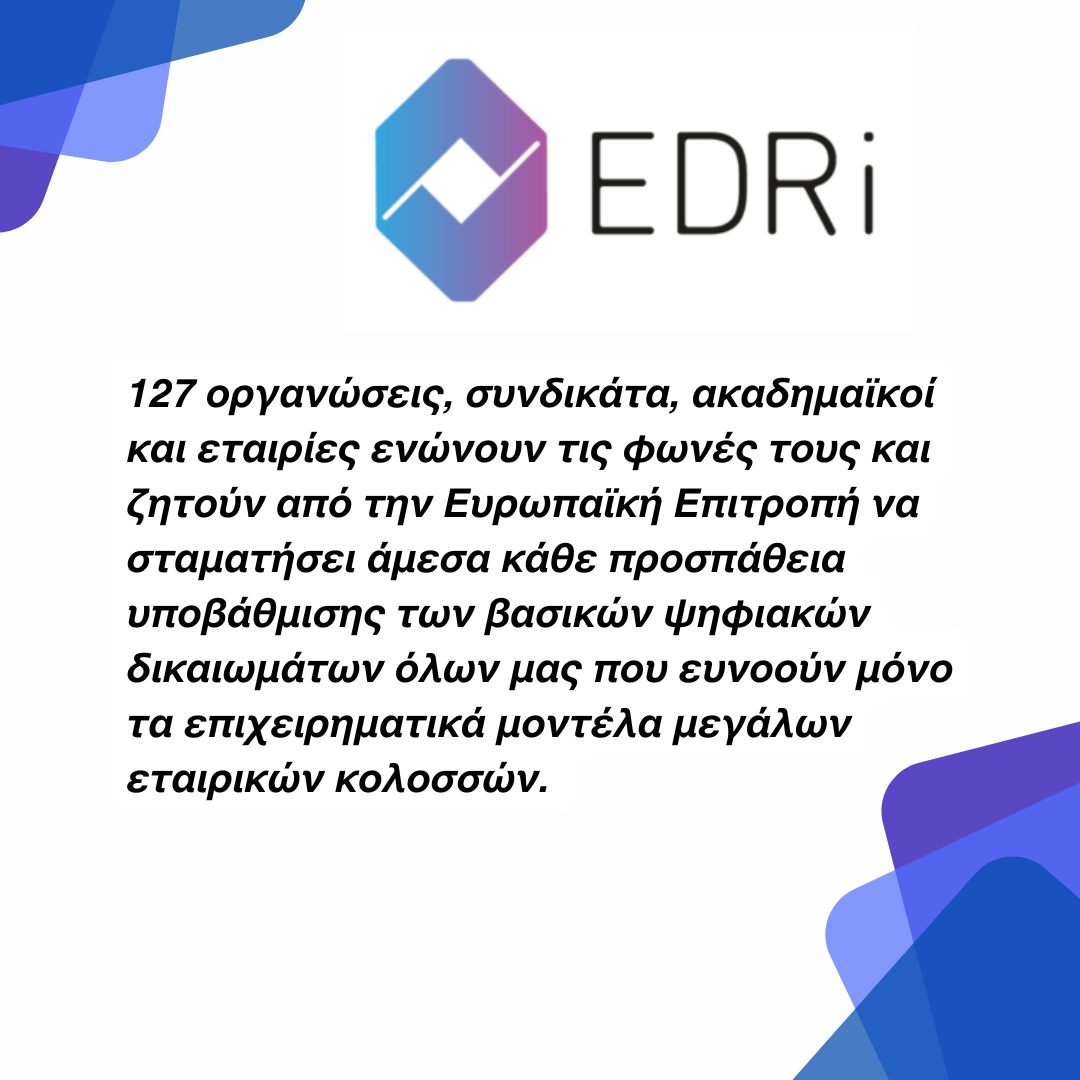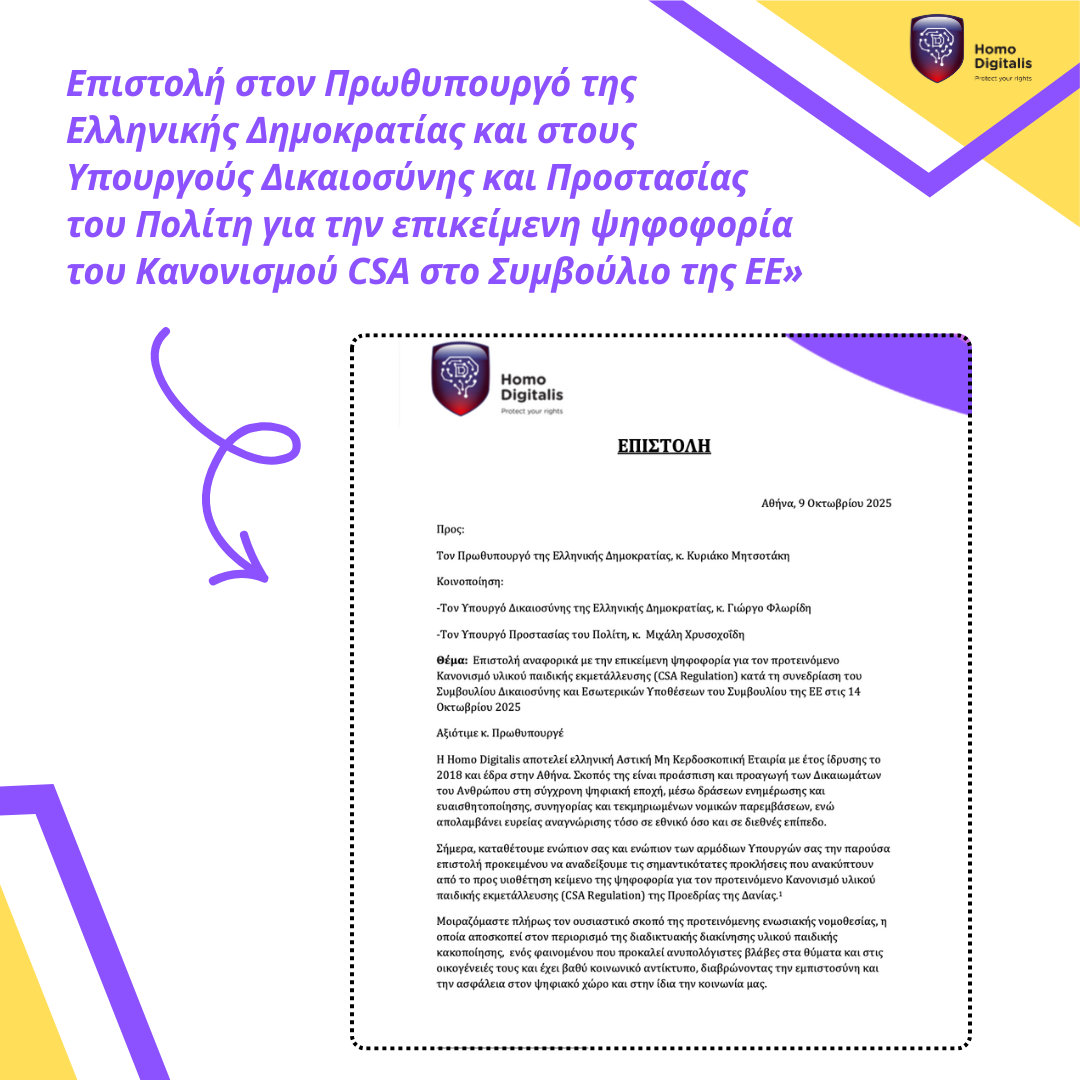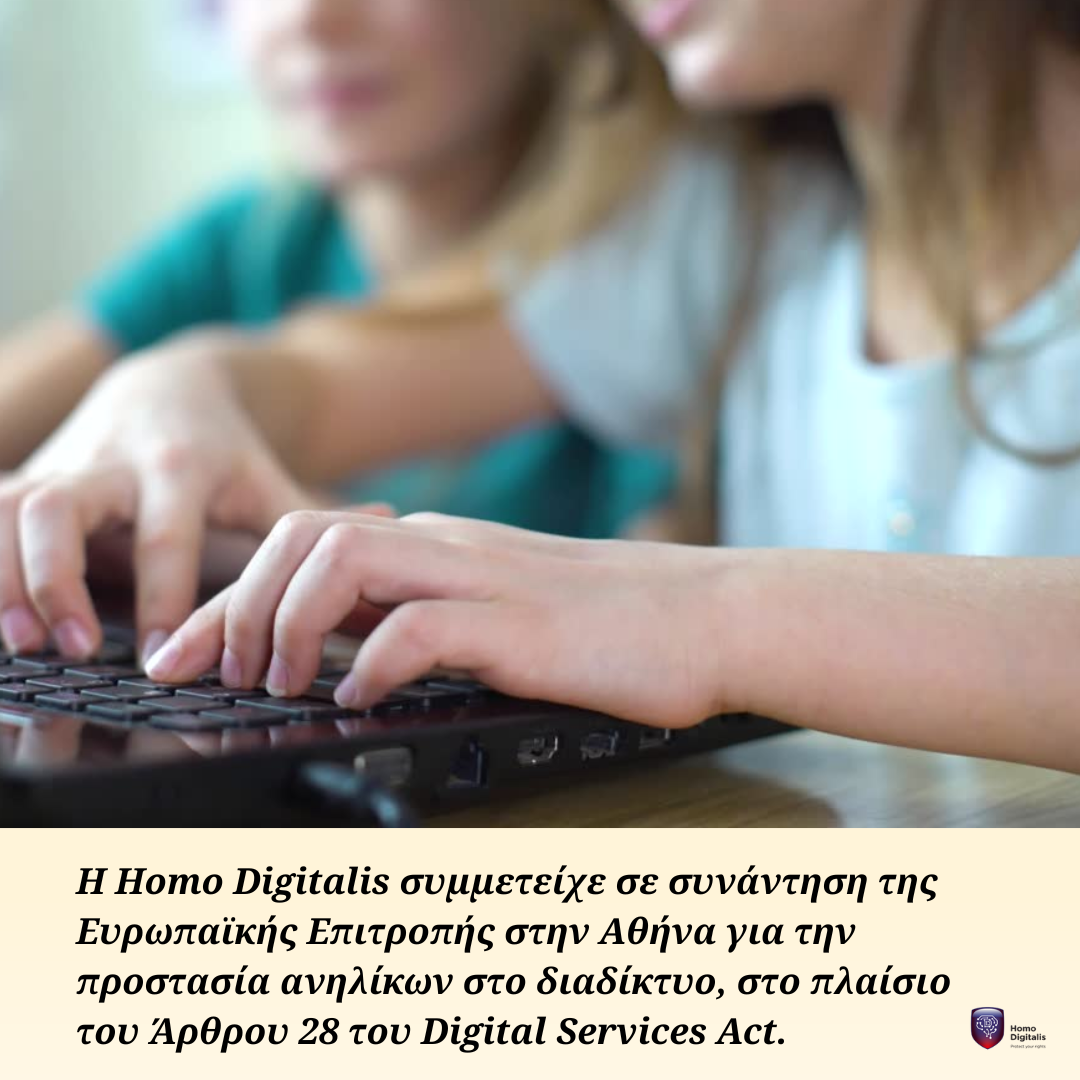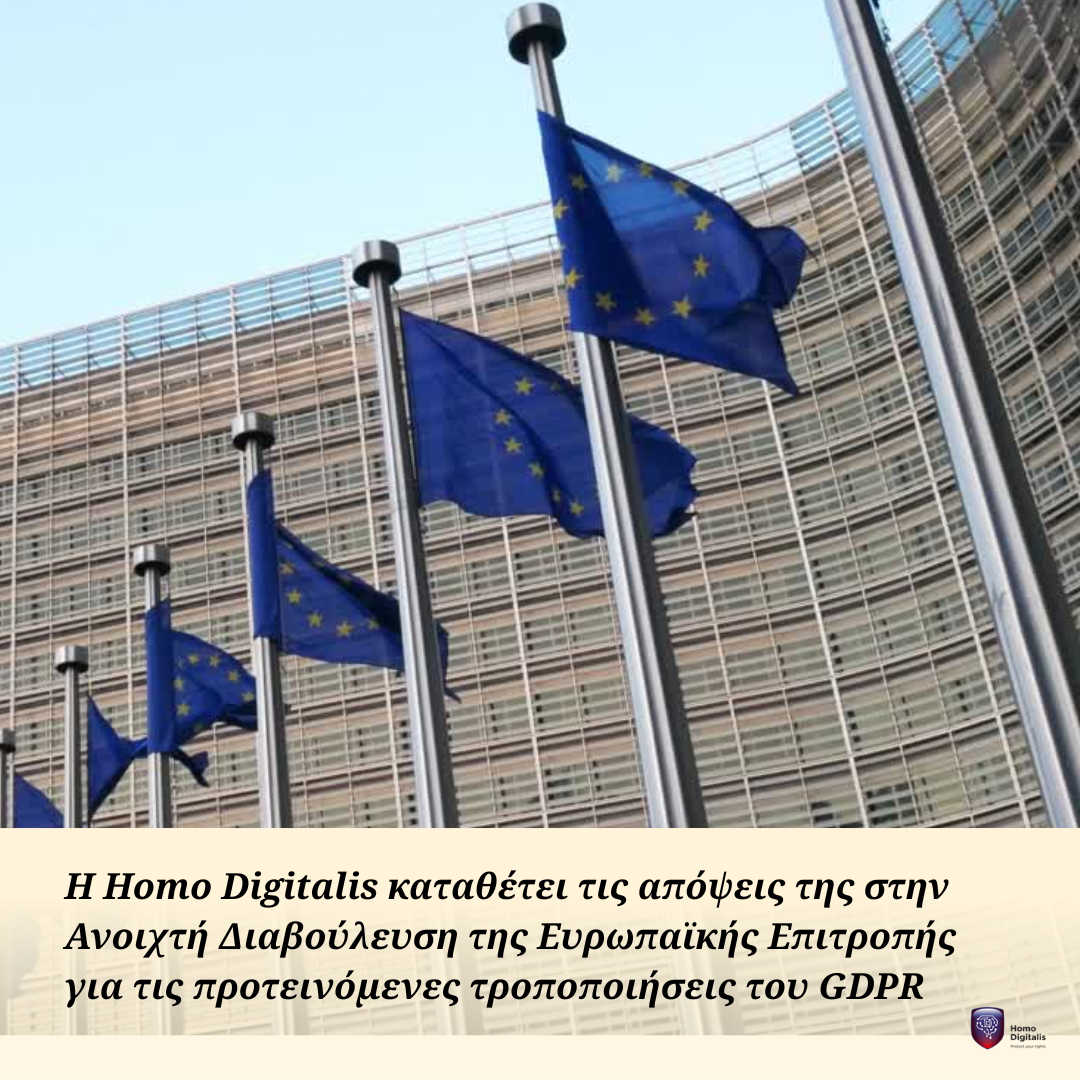The participation of Homo Digitalis in a meeting of the National Commission for Human Rights was successfully completed
On Friday, January 23, we attended in person at the offices of the National Commission for Human Rights for a hearing of individuals and organizations on Artificial Intelligence and Human Rights. There, together with other civil society organizations, public authorities, Independent Authorities, AI research centers and members of the academic community, we presented our views regarding the Digital Omnibus on AI package of measures.
The organization was represented by Lefteris Chelioudakis.
We sincerely thank the organizers for the inclusion and for the opportunity to express the positions of Homo Digitalis.
The participation of Homo Digitalis in an event on the DNA and CAIDA was successfully completed
On January 19, we were invited by Amazon Web Services (AWS) to attend an event focused on legislative initiatives concerning digital policy issues, such as the Digital Networks Act (DNA) and the Cloud and AI Development Act (CAIDA), alongside representatives from institutional bodies and law firms.
During the event, we had the opportunity to express our strong concerns regarding the then-upcoming proposed provisions of the DNA and to put forward the positions of our network. You can read a related commentary on the proposed provisions by epicenter.works here.
The organization was represented by Lefteris Chelioudakis and Konstantinos Kakavoulis. We would like to sincerely thank the organizers for the inclusion and for the opportunity to present our views.
Press Release on today’s announcement of the Digital Omnibus packages:
The proposed provisions of the Digital Omnibus were made public today, placing our rights and the safeguards protecting us in the digital environment at serious risk.
These new proposed regulations threaten the core of the European data protection framework and a range of other digital rights, directly affecting key instruments such as the GDPR, the ePrivacy Directive, and the AI Act.
The European Commission’s broader deregulation agenda primarily serves the interests of large technology companies, sidelining fundamental rights. Through these choices, the European Commission is effectively deviating from its mission and failing to fulfil its institutional responsibility.
We call on the Council of the European Union and the European Parliament to reject this attempt to dismantle the European framework for Digital Rights, and instead to focus on the consistent and effective enforcement of the rules that are already in place.
Read our full press release here.
Joint Open Letter on the Digital Omnibus Packages to the European Commission
On Wednesday, 19 November, the European Commission will present the new “Digital Omnibus,” a reform that threatens to dismantle fundamental protections of our rights and freedoms in the digital sphere.
In May and October 2025, we warned through open letters that this initiative is part of a broader wave of deregulation that will weaken key European rules, portraying rights as an obstacle to innovation and serving the interests of major technology companies.
A few days ago, leaked draft documents confirmed our fears: the EU is one step away from the largest rollback in the protection of human rights in the digital space. The GDPR, ePrivacy, and even the already weak provisions of the AI Act appear to be targeted for dilution, along with other related legislation.
Together with European Digital Rights, 127 organizations, trade unions, academics, and companies are joining their voices and calling on the European Commission to immediately halt any attempt to undermine our fundamental digital rights—efforts that benefit only the business models of large corporate giants.
Read our letter here.
Participation of Homo Digitalis in a Working Group of the European Commission’s AI Office
We’re excited to share that last week Homo Digitalis, represented by our member Tania Skrapaliori, participated in the European Commission’s AI Office Kick-off Plenary for the drafting of the Code of Practice on Transparency of AI-Generated Content (Article 50 AI Act).
We are eager to participate in the respective working groups and actively contribute to this process
During the session, participants heard from the AI Office, met the Chairs and Vice-Chairs responsible for drafting the Code, and learn about insights gathered through the recent multi-stakeholder consultation on transparency requirement
We submit an Open Letter to the Prime Minister, calling on the Hellenic Republic to reject the Danish Presidency’s text on the CSA.
Homo Digitalis today submitted an Open Letter to the Prime Minister of the Hellenic Republic, Kyriakos Mitsotakis, regarding the proposed Regulation on Child Sexual Abuse Material (CSA Regulation).
In our letter — which we have also shared with the Minister of Justice and the Minister for Citizen Protection — we call on the Hellenic Republic to reject the Danish Presidency’s text in the upcoming vote at the EU Justice and Home Affairs Council on October 14, 2025.
The objective of the Regulation — to curb the distribution of child sexual abuse material — is right and necessary. However, the text proposed by the Danish Presidency would achieve the opposite effect, undermining security and trust in the digital space.
Specifically, 787 leading experts in communication security and encryption — including professors from top academic institutions in Greece — have emphasized that:
The technology for detecting child sexual abuse material is inaccurate and ineffective.
Mandatory scanning undermines end-to-end encryption and opens the door to mass surveillance.
The proposed technical measures can be easily bypassed by malicious users and threaten anonymity and freedom of information.
Real child protection comes through education and support for victims, not through mass monitoring.
On October 14, Greece’s position must be guided by knowledge, technical expertise, and the fundamental principles and values upheld by the EU Charter of Fundamental Rights and the Constitution of Greece.
You can read the full text of our open letter here.
You can also read a related article recently published on our website by our member Stergios Konstantinou here.
Learn more about Homo Digitalis’s work on this issue, including past meetings between our members — Haris Kyritsis, Haris Daftsios, Niki Georgakopoulou, Giorgos Sarris, and Angelina Barla — and Greek Members of the European Parliament, in cooperation with European Digital Rights (EDRi), here.
Homo Digitalis Participates in the European Commission’s Meeting on the Protection of Minors Online under the DSA Framework
The Directorate-General for Communications Networks, Content and Technology (DG CONNECT) of the European Commission visited the offices of the Representation of the European Commission in Athens, holding a series of discussions within the framework of the Digital Services Act (DSA) with various stakeholders and interested parties.
On Tuesday, September 30, a meeting was held on the topic of “Protection of Minors,” aiming to exchange views while taking into account the Commission’s recent Guidelines on Article 28 of the DSA and the need to strengthen the protection of minors online.
Homo Digitalis had the honor to participate in the discussion alongside representatives from independent authorities (EETT, Hellenic Data Protection Authority, National Council for Radio and Television), as well as representatives from the Ministry of Digital Governance, the academic community, and other organizations.
We warmly thank Ilektra Makraki, representative of the European Commission Representation in Greece for the DSA, for the invitation and inclusion. Homo Digitalis was represented at the meeting by its Co-founder and Executive Director, Eleftherios Chelioudakis.
We submitted our views to the European Commission’s public consultation on the assessment of the impact of the Digital Markets Act (DMA)
On September 23, Homo Digitalis submitted its views to the European Commission’s Public Consultation as part of the report it is preparing on the assessment of the impact of Regulation (EU) 2022/1925 on Digital Markets (Digital Markets Act – DMA).
The real impact of the DMA depends on the Commission’s determination to enforce it, honoring both the letter and the spirit of the regulation — namely, to create open and competitive digital markets, strengthen competition, and protect users’ rights.
You can read our full submission here.
For more information about the public consultation, click here.
We submitted our views to the European Commission’s public consultation on Article 30(5) GDPR
Yesterday, Homo Digitalis submitted its views as part of the European Commission’s public consultation on Article 30(5) of the GDPR.
In our submission, we call on the Commission to withdraw the proposed amendment and stress the need to ensure that the GDPR is not reopened or modified through broader deregulatory initiatives. The priority must remain on the effective application and enforcement of the existing framework, rather than on reducing the safeguards that are essential for protecting fundamental rights in the digital age.
You can read our full position here.
